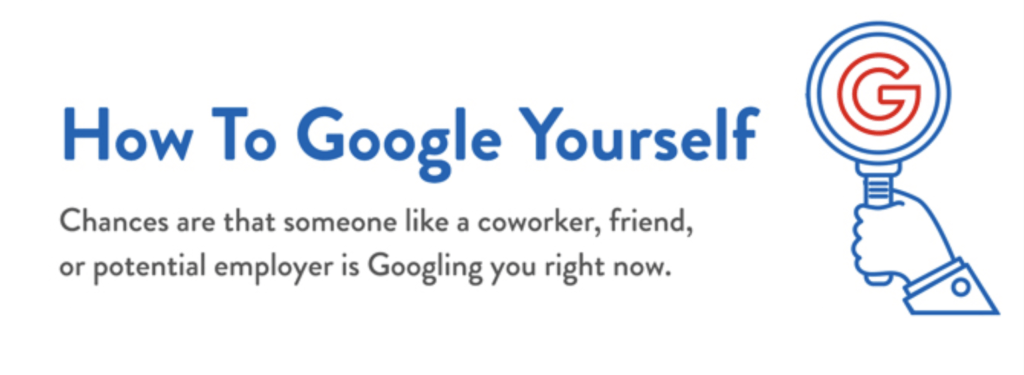Want to improve and protect your online reputation? Learn how to Google yourself. Hint: it’s more involved than you may think. To be truly effective, you’ll need to understand why it’s important, how to get the most information, and how to handle what you’ve found. We’ve covered all of it in this simple guide.
Why you need to Google yourself
One of the first things recruiters, hiring managers, business associates, even potential friends and dates will do when considering whether to associate with you is search your name in Google to learn more about you.
How Google can help
This is not necessarily a bad thing. Many people have plenty of information they want to show off online. Volunteer work, online portfolios, speaking engagements, and extensive networks can all be found online and reflect positively on your reputation. This is the sort of thing you want to find on Google, and it’s what hiring managers and others who might search for you online would want to see.
What you may find on Google
In some cases; however, what appears at the top of your search results may not always be an accurate reflection of you as a person. In this 2015 survey of 1,000 adults, 20 percent of respondents found inaccurate information and 30 percent found their content shared without permission. An unfortunate 12 percent said they were unpleasantly surprised by their findings. And eight percent found information that damaged their online reputation.
In fact, it’s quite rare to be completely pleased with your online reputation. The survey indicates that only 22 percent of people find information that is exactly what they want people to know about them.
How Google search results affect you
If not properly managed, information found online can affect you negatively. In the Domain.me survey, 24 percent of adults and 43 percent of millennials in particular said they’ve been negatively affected by online information. This is no surprise, as the survey indicates that most people will use search engines to learn more about people they’re considering doing business with.
For example, patients may research a physician’s reputation prior to seeking care. Many others will perform online searches before meeting with a date or acquaintance. 42 percent of overall respondents and 57 percent of millennials admit to changing their mind about a colleague or friend based on what they found online about them.
57 percent of millennials say online information affects their opinions!
Are people concerned with Google results?
Few people actually take the time to research themselves online, a whopping 60 percent of respondents never do searches of themselves. Many of those who do, only check their search results once or twice a year. A rare seven percent set up alerts for their names and only five percent use reputation management software.
This is not to say that people are not concerned about the impact of online information. 66 percent of millennials admitted they worry that online information may negatively affect their reputation. But those who have been harmed by online information know better. 77 percent of survey respondents who had a negative experience with online information regularly monitor their online information.

How to Google yourself
The basic idea of Googling yourself is simple: just enter your name or your brand’s name into Google and peruse the first few pages to see what you find. This will give you a good idea of what another person might find, but there are a few things you can do to make your searching more effective.
Go private
To get a more accurate picture of what another person would find when searching your name, you’ll want to open a private browsing window. Your browsing history, social profiles or other accounts you may be logged into, and other factors can impact which search results you see. You’ll still get local search results, but a private browsing window will help keep the search neutral. If you don’t go private, at least log out of any email or social media accounts.
Use quotation marks and modifiers
To get the most accurate results, combine your first and last name together with quotation marks so that you’ll only see results that include your full name, rather than combinations of your first and last name. If you’re using a different name on your resume, be sure to look for that one as well.
If you’re not seeing much or want to explore more, consider adding modifiers such as your address, city, or state (former or current), school names, company names, and anything else that could be used to distinguish you from others. Experiment with different combinations to see what comes up.
It’s also a smart idea to search for email addresses, even screen names that are connected to you, particularly those listed on your resume or used for communications with those that might search for you. These searches can reveal online forums and social media accounts.
Visit the first five pages
Most people won’t look past the first few results, and rarely past the first page on Google, but it’s best to be thorough to get a full picture of your digital reputation. After all, negative search results can easily move higher and gain better visibility.
Dig deeper into your Google search
Organic search results are some of the most important, but you should also take a look at Google’s other results. Click on Images, Videos, News, and Blogs in Google to see what results are returned.It’s also smart to look specifically for social media accounts if they’re not already apparent in search results. Consider searching for court records as well.
Analyzing your Google results
Looking at your Google results, you may not see exactly what you’d expect. If you have a popular name, many entries may not even be relevant to you. If no results are returned that are about you, you may need to consider creating properties that will rank highly for your name. Having no web presence can raise suspicions and can potentially be just as damaging as negative content.
Organize and classify your search results
As you delve into the search results, write down what you find. Keeping a spreadsheet would be especially helpful, as it would allow you to note which search results are relevant, positive, neutral, or negative. A spreadsheet can also be used to note any action you’ve taken on each result. For instance, did you attempt to remove search results from Google? If you were unsuccessful, did you try to push them down and off page one?
Consider how your Google results represent you. Is the information accurate and positive? Could your information be more up-to-date, especially on your own website or social media pages? Businesses should consider updating local listings if they’re out of date or not appealing.
Monitor your Google results
Performing one search isn’t sufficient. To really get helpful information, you’ll need to get an ongoing look at what’s available about you on Google. It’s a good idea to set up Google Alerts with your name and related search results so that you can find out right away when there are new entries you should analyze. Understanding what is being published about you on a regular basis is the first step to managing your reputation. Once you know where the problems are, you can begin to take action to improve your online reputation.
Reputation Management Resources

10 Questions to Ask Your ORM Firm
Spot a high-risk ORM firm with these simple questions.

How to Push Down Negative Search Results
Find out how to bury negative search results in Google

Reputation Management Pricing Guide
Find out how reputation management pricing works.

